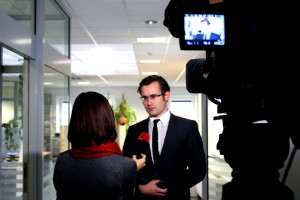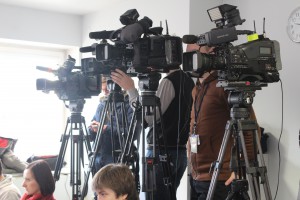Download bilingual e-version (LT/EN) of the Survey of the Lithuanian Economy: files.lrinka.lt/LET2013_2014_1/LET32.pdf


In 2014 Lithuania’s economy is forecasted to grow moderately. To expect a steep rise is too early, shows the Survey of the Lithuanian Economy. According to surveyed market participants, Lithuania’s gross domestic product (GDP) will grow by 3.5 per cent, the unemployment rate will decline slightly (to 10.7 per cent), and prices will increase by 2.6 percent. Better forecasts are suspended; one of the major problems remains the lack of investment. The survey is conducted by Lithuanian Free Market Institute, a Vilnius based economic policy analysis center.
“There will be no major changes in Lithuanian economy – this year and next year the economy will grow at a similar pace as in 2012, the unemployment rate continues to gradually decline, prices will rise, but slightly slower. Such reticence partly reflects uncertainty about future economic policies of Lithuania. Investment breakthrough is necessary for the rapid economic growth, but we still face problems in this area,” said Vytautas Zukauskas, senior policy analyst of LFMI.
Statistics is providing a strong relationship between investment level, labor productivity and average wage in Europe. Based on the data of EU countries from 2012, an increase of investment level per person by 10000 LTL, increases labor productivity by 3,4 LTL per hour and the average monthly wage by 433 LTL.
Level of accumulated investment per person in Lithuania is 3 times lower than EU average; it is 7 times lower than in Norway, 3 times lower than in Germany and 60% lower than in Estonia.
27% of survey participants claimed that the most important obstacle for investment growth was the level of bureaucracy and corruption. The second in importance reason is unfavorable tax environment for investment and its volatility (20%). 17% blamed small market. 7-9% of participants mentioned such reasons as unfavorable regulatory environment for investment, insufficient protection of property rights, insufficient recognition of Lithuania as investment destination, poor economic situation of a country, lack of professionals and qualified employees, other.
„Figures show that investment environment in Lithuania and problems related to it are mainly determined by laws and actions of state institutions. In recently announced Doing Business index Lithuania improved more than half indicators and climbed from 27th to 17th position. However, the improvement of business conditions has to be a continuous activity, otherwise we will quickly fall behind again”, says V. Zukauskas.
Another additional question of the Survey was related to business environment in Lithuania, i. e. with a business regulatory institutions reform started in 2009. This reform seeks that regulatory agencies would devote more attention for consultations, explanation of requirements, but not punishment. As well – the reduction of administrative burden, etc.
More than a third (37%) of surveyed experts said that change can be felt and they are in line with the goals of the reform and the situation is better. The number increased by 7% since the beginning of 2012.
According to V. Zukauskas, the reform of government institutions that regulate businesses is a long process, but the positive results can already be felt, so the work needs to continue.
A Survey of the Lithuanian Economy is based on a non-representative poll of successful market participants – business owners and managers, finance analytics. This research is the oldest alternative source of statistics, where data is given by those who use it in their daily activities. Market participants’ successful performance reflects their capabilities to process information.
SUMMARY
- Investment is one of the most important sources to increase productivity and wages. Statistics is providing a strong relationship between investment level, labor productivity and average wage in Europe. An increase of investment level per person by 10000 LTL increases labor productivity by 3.4 LTL per hour and the average monthly wage by 433 LTL.
- Lithuanian economy in 2013 and 2014 will be growing at a similar pace as in 2012, unemployment level will continue to decrease and the growth of prices should slow down.
- Even though Lithuanian trade volume grew rapidly for the last several years, market experts estimate that this growth should slow down.
- Experts estimate that shadow economy will shrink. In 2013 the shadow economy as a percentage of GDP should be 24% and in 2014 – 23%. Market experts estimate that in 2012, about 41% of households and 27% of companies were involved in shadow economy or conducted a part of their activities in it.
- Even though, based on market participants estimates, 24% of settlements in cash were illegal; limiting settlements in cash would not solve problems of shadow economy in Lithuania.
- Based on market experts estimates, the average wage in Lithuania should grow by 5% in 2013 and in 2014, this means that this is not just a nominal growth of wages, but a real one (i.e. adjusting to price inflation). Market experts forecast that 2014 will be a first year, when the nominal average (no adjustment to price inflation) wage reaches the level of 2008.
- Market participants think that investment environment in Lithuania and problems related to it, are mainly determined by laws and actions by government institutions. The most important obstacle mentioned by experts for investment growth was the level of bureaucracy and corruption (27%). The second in importance reason is unfavorable tax environment for investment and its volatility – 20%
- When asked about the reform of government institutions that regulate business, the majority of experts (54%) said, that they do not feel any changes. The positive thing is that, the share of experts who said that the situation got better, if compared with a previous survey had increased.
32nd LFMI survey results
|
Indicator
|
Forecast for 2013 reported in July 2012 |
Forecast for 2013 reported in February 2013 |
Forecast for 2013 reported in September 2013 |
Forecast for 2014 reported in September 2013 |
|
|
MACROECONOMICS
|
|
| GDP growth |
3,0%
|
3,4%
|
3,2%
|
3,5%
|
|
| Unemployment rate, end of period |
13,0%
|
11,7%
|
11,5%
|
10,7%
|
|
| Changes in consumer price index, end of period |
3,4%
|
3,5%
|
2,5%
|
2,6%
|
|
| Export growth |
11,0%
|
10,1%
|
9,5%
|
9,1%
|
|
| Import growth |
12,0%
|
9,9%
|
8,9%
|
9,1%
|
|
| Shadow economy, percent of GDP |
25,0%
|
26,3%
|
23,5%
|
23,4%
|
|
| Tax burden, percent of GDP |
36,0%
|
37,2%
|
34,3%
|
34,7%
|
|
| Average monthly net earnings, after taxes |
1738
|
1769
|
1744
|
1828
|
|
|
ADDITIONAL QUESTIONS
|
|
|
1. In your opinion, what percentage of economic units that exercise economic activities did a part of their activities in the shadow in 2012? (Purchased or sold illegal goods or services, worked or employed illegally, received or paid wages illegally „in envelope“, hid income or carried out activities while trying to hide taxes or bypass regulations.)
|
|
|
|
• Private individuals, households
|
• A legal person, companies
|
|
|
|
41%
|
27%
|
|
|
2. What share of settlements in cash were illegal in Lithuania in 2012 (i.e. unaccounted income, a share of or all taxes were hidden, settlements between private and between legal entities)?
|
|
|
|
24%
|
|
|
3. Would businesses operating in Lithuania benefit from introduction of the Euro in 2015?
|
|
|
|
Yes, businesses operating in Lithuania would benefit more from introduction of the Euro than would lose;
|
It is difficult to say, it depends from in what state Eurozone countries would be and how the Euro would look like in time of the introduction.
|
No, businesses operating in Lithuania would lose more from introduction of the Euro than would benefit;
|
|
|
64%
|
31%
|
5%
|
|
|
4. The level of accumulated investment in Lithuania is almost 3 times less than the EU average. What are the most important barriers for investment growth in Lithuania?
|
|
|
| High level of bureaucracy and corruption; |
27%
|
|
| Unfavorable tax environment for investment, volatility of it; |
20%
|
|
| Small market; |
16%
|
|
| Lithuania is insufficiently know country by foreign investors; |
8%
|
|
| Poor economic situation of a country, small purchasing power of the population; |
8%
|
|
| Lack of professionals and qualified employees; |
7%
|
|
| Other; |
4%
|
|
|
5. A reform of business regulatory institutions was started in 2009. Do you feel any changes in the field of business regulatory bodies?
|
|
|
No, did not observe any changes;
|
Yes, the situation got better (changes are in line with reform goals);
|
Yes, but the situation got worse (changes are not in line with reform goals, behavior of regulatory agencies got worse);
|
|
|
54%
|
37%
|
9%
|
|